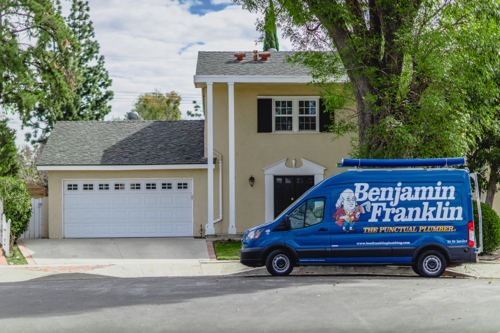Creating a Healthier Home Wiith Fltered Water
Is it a life-changing health breakthrough or hyped-up trend when it comes to reverse osmosis (RO) water? It’s a question that may be on your mind if you’re considering upgrading your home’s water filter. The truth is that RO water has its share of drawbacks and benefits. Here’s what every homeowner needs to know!
What Is Reverse Osmosis Water?
A point-of-use reverse osmosis (RO) system is a popular filtration method that reduces levels of common contaminants found in drinking water. It can be installed by your local plumber! During the RO filtration process, water is pressurized and passed through a semipermeable membrane that blocks and filters out contaminants. After the contaminants are flushed away with excess water, the filtered water is placed in a storage tank that feeds into your home’s faucets.
The Pros of Reverse Osmosis Water
For many homeowners, RO water is simply the most cost-effective and hassle-free way to get purer water. Here’s a look at the core benefits:
- Strong Purification Power: RO filtration removes up to 99% of contaminants found in water. That includes viruses, bacteria, chlorine, pesticides, nitrates, and heavy metals that would otherwise be in your family’s drinking water.
- No Color or Odor: If you’re noticing unappetizing colors or odors in your home’s drinking water, an RO filter can deliver a “blank slate” that creates a fresh drinking experience. This is actually the reason why many restaurants use RO filtration for water that will be used for coffee or juices. Many chefs also find that cooking with RO water offers better results due to the balance of minerals.
- Gentle on Skin: Reverse Osmosis filtration isn’t just great for improving the quality of drinking water. Don’t forget that water that comes from your home’s taps also impacts skin health. Many people find that RO helps to relieve dry skin, skin breakouts, and skin irritation. RO could be the secret to softer, glowing skin!
- Efficient: Many distillation and filtration systems come with hidden costs because they require heavy energy use. Homeowners are often surprised to see their monthly energy bills climb after having filtration added. That’s not the case with RO because these systems are extremely efficient by comparison. In fact, you’re not likely to see a jump in your energy bill at all. If you’ve been purchasing bottled water to avoid drinking your home’s unfiltered tap water, your savings after switching to RO can be significant.
- Reduced Scale: Tired of seeing flaky, caked-on corrosion and scaling on your home’s faucets and showerheads? RO actually removes the calcium and magnesium ions responsible for damaging fixtures. In addition, you’ll see reduced clogging and buildup in pipes and coffee machines.
The big takeaway on the pros of reverse osmosis is that homeowners enjoy healthier, cleaner water. In addition to enjoying water that tastes and looks better, you’ll benefit from the fact that water will be healthier for both your insides and outsides. Next, take a look at some of the drawbacks of RO to consider.
Cons of Reverse Osmosis
While the case for RO is strong, this may not be the ideal solution for every home. Take a look at the potential downsides:
- Slower Filtration: RO water filtration can be slower compared to other methods because water has to pass through small membranes during the process. However, it’s important to keep in mind that this “slowness” is tied to the meticulous nature of RO filtration. In general, an average-sized household with average water usage won’t struggle with RO’s filtration speed.
- Higher Initial Cost: RO filtration pricing is slightly higher than other household filtration options. However, homeowners find that the long-term efficiency and cost savings justify the higher initial investment.
- Maintenance Requirements: First, it’s important to note that no household water filtration system comes without maintenance needs. However, homeowners choosing RO should be prepared for the fact that membranes that are responsible for filtering need to be replaced roughly once every two to three years. In addition, filters should be replaced once every three to six months. Poor maintenance will result in slower efficiency and lower water quality.
- Slightly Acidic Water: Reverse Osmosis water can be slightly more acidic compared to pure water. It has to do with the fact that RO water lacks salt and other soluble materials. While not harmful, water may be slightly more corrosive.
While RO water filtration does require some compromise, many homeowners find that the benefits far outweigh the downsides. Don’t forget that you can also speak with your local plumber about designing a plumbing system to offset some of the downsides of this type of system.
If it turns out that Reverse Osmosis isn’t the right option, your plumber can also introduce you to other popular filtration options that meet your household’s needs. These options include carbon filtration, UV disinfection, and ion exchange.
Should You Consider Reverse Osmosis Water Filtration at Your Home in Pompano Beach, FL?
RO filtration is a very popular option among homeowners in Pompano Beach and the rest of Broward County who want contaminant-free, delicious water. RO is a great method for removing impurities that are common in the local water supply here in South Florida. Let’s get your home’s water healthy!
Talk with a local pro from Benjamin Franklin Plumbing about adding a custom, cost-effective filtration system to your home. We’re the punctual plumbers who can provide quick quotes and fast work. If there’s any delay it’s YOU we pay! To learn more, call (754) 220-1312 today!
